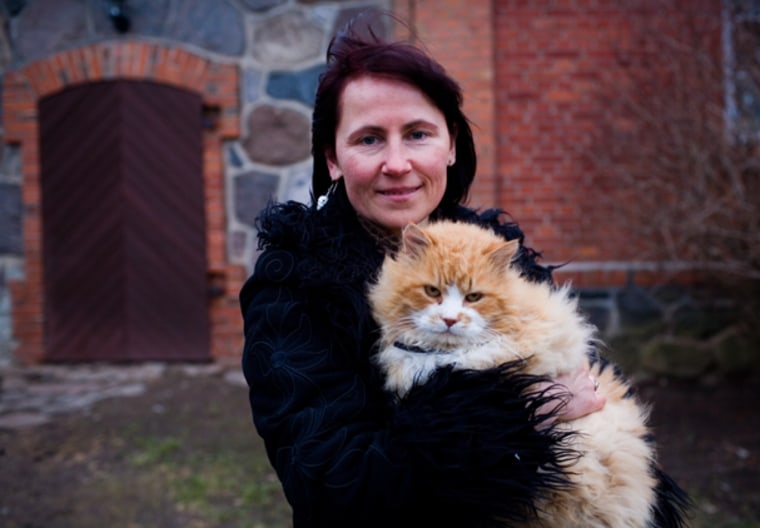The window in front of Laima Muktupavela’s desk at home gazes down upon the swampy forestland of northeastern Latvia from which wild mushrooms spring forth.
The view is fitting for Muktupavela, a journalist turned author and filmmaker who five years ago packed up and moved to Ireland to join thousands of Latvian workers picking mushrooms until their fingers turned black. The experience yielded a best-selling novel, “The Mushroom Covenant,” propelled Muktupavela into a full-time literary career and made her an unofficial spokesperson for the generation of Latvians driven to Western Europe in search of a livable wage.
“I have experienced it. I know how it is when your boss shouts, when we worked from 6 a.m. until the very last mushroom (was picked),” the vivacious 45-year-old said. “Five years ago I experienced it. Then, my boss could say to me, if the mushrooms are badly picked, ‘Go home!’”
Muktupavela, who acknowledged that her situation was easier than most other mushroom-pickers because she planned eventually to return to her life in Latvia, said her employer’s words nevertheless made her “upset because I did not want to [leave] .... Where would I work?”
Her time in Ireland exacted a personal toll. Muktupavela’s teenage daughter felt so abandoned that for a time she stopped speaking to her mother. (They have since reconciled and her daughter is studying at a British university).
Local legislation and the addition to the theoretically borderless European Union in 2004 of eight Central and Eastern European countries, including Latvia, has lessened exploitation of many foreign workers in Ireland and other Western European countries.
“Now, if any boss says anything to his worker, lift your hat and calmly walk away, because you know that your work will be needed somewhere else,” Muktupavela (pronounced mook-tuh-PA-veh-la) told MSNBC.com during an interview in her handsome two-story, redbrick home that she shares with her husband, cats and dogs.
“But exploitation existed. I was a witness to it. I was one of them,” she said.
‘People need bread and money’
Muktupavela does not fault those who have left home to seek better wages abroad.
“People have left to earn money because they want to live,” she said. “People need bread and money.”
Latvian European Commissioner Andris Piebalgs estimated earlier this year that between 15,000 and 40,000 Latvians are working in Ireland right now. Most Latvians in Ireland are employed in agricultural or other low-wage work.
“The government definitely wants to encourage people in the EU to come in and fill the gaps in labor in Ireland,” said Aoife Collins of the Immigrant Council of Ireland. “People here do see migrants as useful and see that we need migrants to fill those shortages.”
On the farm where Muktupavela worked in County Meath, north of Dublin, Latvian mushroom-pickers worked from dawn to dusk. Frustratingly, Muktupavela said local Irish workers would arrive later and leave earlier than the foreign pickers, but were paid better than the migrant laborers.
Though exhausted, she used evenings to whittle away at her novel, a story about two lovers torn apart after one of them goes to Ireland to pick mushrooms.

Still, Muktupavela is grateful for the Irish farmer who employed her because of the inspiration the conditions provided for her writing.
Now, she is working as a screenwriter and producer for a multipart film about the lives of Latvian migrant workers in Ireland, which rolled out this spring.
Though born in the capital, Riga, Muktupavela is profoundly attached to the land, always using local products to prepare meals for her and her husband (“The forest is my supermarket,” she said as she fed recent visitors a homemade meal of mushroom and potato soup and fresh-baked rye bread).
‘Five years from now these houses will be full’
In Muktupavela’s estimation, Latvia’s future is bright.
“Before Latvia joined the European Union … the children who were left behind waited for the return of their mothers and parents. But now the children know that their education can be useful and … they learn languages and they travel — not only to work, but to see the world,” she said.
Although some ramshackle homes and farmhouses in eastern Latvia stand abandoned now, Muktupavela is bullish about the agricultural region’s prospects.
“Five years from now these houses will be full, if people will see .... [a] change of the economic situation,” she said. “Here we will be able to see how much the government thinks and cares for its people in the work it does.”
